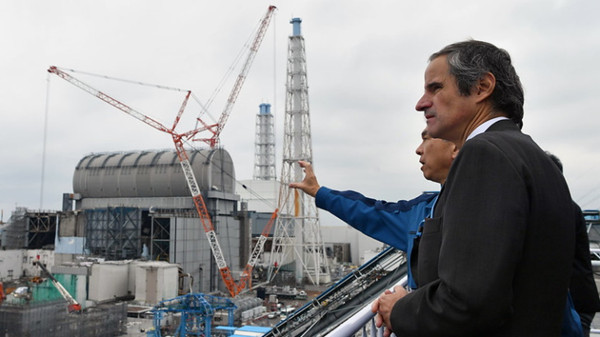Japan has made a "systematic and meticulous" effort in decommissioning the damaged Fukushima Daiichi nuclear power plant, International Atomic Energy Agency (IAEA) Director General Rafael Mariano Grossi said after visiting the plant yesterday. The IAEA is ready to provide further support, he said, for the disposal of contaminated water stored on the site.

IAEA Director General Grossi surveys clean-up work at the Fukushima Daiichi plant (Image: Dean Calma / IAEA)
Grossi visited the Fukushima Daiichi plant yesterday during his first official visit to Japan since taking office late last year. He met Prime Minister Shinzo Abe and other senior Japanese officials in Tokyo the previous day.
Commenting on Japan's efforts to decommission the plant and revive the surrounding area, Grossi said: "What I saw today has been very impressive. I've witnessed a very systematic and meticulous effort to deal with every obstacle you have been finding along the way." He added, "The trend is very encouraging. We have been working with Japan since day one and we have seen all this progress. Of course, there are still challenges to address in the years ahead."
One such challenge is the removal of large volumes of treated water stored at the Fukushima Daiichi site. Contaminated water is treated by the Advanced Liquid Processing System (ALPS), which removes most of the radioactive contamination, with the exception of tritium. This treated water is currently stored on site, but capacity limits will be reached by 2022. As of the end of 2019, there was 1,080,700 cubic metres of treated water stored in tanks at the site.
In late-2018, an IAEA-led mission of experts advised Japan to take a decision urgently on the disposal plan for water treated through the ALPS process. A Japanese expert committee report submitted to the government earlier this month outlined two options to dispose of the treated water: vapour release and discharge into the sea. The government has asked the IAEA to review the committee's report. The IAEA considers both options as "technically feasible and in line with international practice". However, the government has yet to make a decision on how to proceed.
Grossi said: "Once a decision is taken on the way forward, the IAEA would be ready to assist in its implementation, for example in radiation monitoring. It could help provide reassurance to the public - in Japan and elsewhere - that any releases of water would be within international standards."
Grossi also visited J-Village, the sports centre which was commandeered to support stabilisation of the power plant immediately after the March 2011 accident but which has now been returned to its original purpose and is being prepared to play a role in the 2020 Olympic and Paralympic Games. J-Village will be the starting point next month for the Olympic torch relay. "The J Village training facility can be seen as a symbol for the reconstruction of the region near the Fukushima plant," he said.